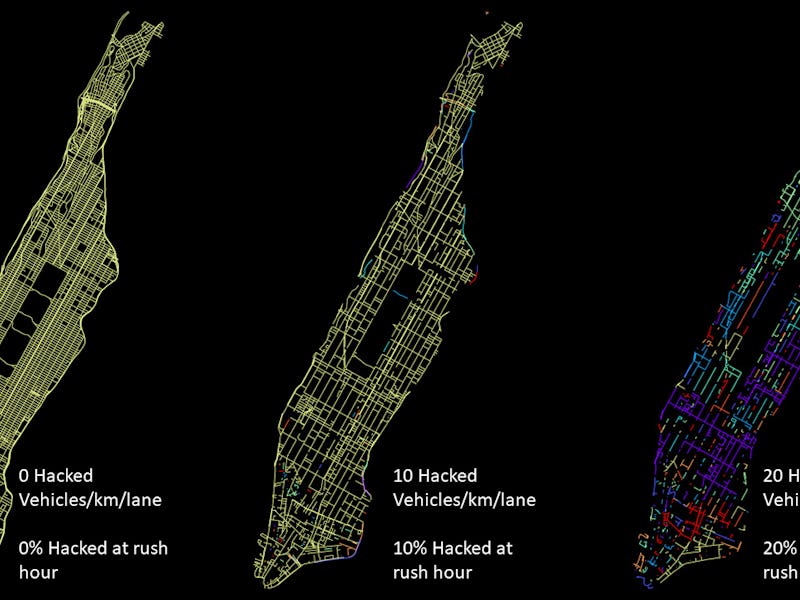Hacked Self-Driving Cars Would Cause Chaos, Study Suggests
That ridiculous 'Fate of the Furious' scene isn't that far-fetched.

As the battle for the autonomous car market amps up, with Tesla, Waymo and emergent startups all vying to be the first to render human drivers irrelevant, the public’s worries about crashes and pedestrian fatalities have slowly abated. But new research suggests that at least some of the fears about self-driving cars, particularly their potential to exacerbate traffic jams, aren’t unfounded.
Essentially, that ridiculous scene from The Fate of the Furious isn’t all that far-fetched.
The latest academic to sound the warning that autonomous driving might worsen traffic, rather than improve it, is Skanda Vivek, a postdoctoral researcher at the Georgia Institute of Technology. In a new paper whose findings Vivek presented Monday, he argues that internet-connected autonomous vehicles are not only hackable, but that hacking even a small percentage of the self-driving cars currently on the road in the U.S.’s largest city could completely stop the flow of traffic and impede the effectiveness of emergency vehicles. Vivek and his team presented their findings at the American Physical Society March Meeting in Boston.
“Compromised vehicles are unlike compromised data,” writes Vivek in his study’s press release “Collisions caused by compromised vehicles present physical danger to the vehicle’s occupants, and these disturbances would potentially have broad implications for overall traffic flow.”
Self-Driving Cars Will Still Cause Traffic Jams
After realizing that risk management studies around autonomous vehicles had all focused on the individual crashes caused by, say, poor vehicle reaction time when stopping, Vivek wanted to take a step back and review the situation from a larger perspective. No research had been done to quantify the effect of a “large-scale hack” on traffic flow, and studies focused on the problem of human error tend to find that replacing humans are likely to make roads safer.
To determine the impact of a possible hack, Vivek and his team ultimately turned to percolation theory, a section of probability theory that focuses on the behavior of connected clusters in a random graph, to determine how hacked autonomous cars would affect the already-complicated traffic ecosystem of New York City in real time. The findings? Not great: city-wide gridlock, millions of commuters trapped, and emergency vehicles stuck miles from potential emergencies.
It would not take many cars at all to make the worst-case scenario possible, Vivek’s team found. In fact, 90 percent of the cars on the road in New York City could be unaffected by the theoretical hack, and the city would still be plunged into chaos and gridlock, the study found.
By eliminating the potential for human error, self-driving cars are supposed to slay traffic jams. But it may not be that simple.
How to Make Self-Driving Safe
This does not mean that self-driving cars should be relegated to the scrap heap. Indeed, after terrifying all of us with visions right out of a dystopian action movie — think Pixar’s Cars but horrible and with real vehicles — Vivek has also presented a possible solution: a “compartmentalized multi-network architecture.” By ensuring no more than five percent of autonomous vehicles are on a given network, Vivek thinks the risk of a city-wide traffic jam would drop. Hackers would have to execute multiple breeches simultaneously in order to effect real mayhem.
Ultimately, Vivek’s research isn’t intended to scare us away from the prospect of autonomous cars. It’s ensuring that when they hit the road (not “if”), they avoid some of the more serious pitfalls.
“Our work is not in opposition to the future of connected cars,” said Vivek. “Rather, the novelty of our work lies in identifying and quantifying the underlying cyber-physical risks when multiple connected vehicles are compromised. By shining a light on these technologies at an early stage, we hope we can help prevent worst-case-scenarios.”
Other researchers have raised the possibility that self-driving cars will not exactly be a traffic-killing panacea. Earlier this month, another researcher from the University of California, Santa Cruz, argued that, by negating the need for parking — after all, why park when your autonomous car could ferry ride-sharing passengers for cash or whisk off to the post office to grab that Amazon package on your behalf — self-driving cars will almost never leave the road. If that scenario comes to pass, self-driving cars won’t need to be hacked to make your morning commute a nightmare.